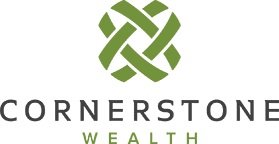7 Key Takeaways for the OBBA or One Big Beautiful Bill Act of 2025
Cornerstone Wealth Fiduciary Insights: The New Tax Law’s Impact and Your Best Next Move
Executive Summary
The 2025 One Big Beautiful Bill Act (OBBA) marks a pivotal change in individual income tax law for high-earning professionals, business owners, and families with complex financial lives. This comprehensive legislation demands a proactive approach to tax planning, incorporating tax provisions and deduction strategies, including utilizing opportunity zones, and going beyond generic advice. At Cornerstone Wealth, we are committed to guiding you through these updates with personalized strategies, in collaboration with our tax advisors.
To avoid surprises and optimize your financial future, financial advisor tax planning is your most valuable tool.
1. Key Personal Tax Bracket and Rate Changes: What Every Tax Planning Advisor Wants You to Know
Summary
Bracket structure (10%, 12%, 22%, 24%, 32%, 35%, 37%) is now permanent from 2026 onward.
Bracket thresholds adjust slightly, affecting high earners most at the top brackets.
Example Brackets for 2026:
10%: up to $13,000 (single) / $26,000 (joint)
12%: up to $50,000 (single) / $100,000 (joint)
22%, 24%, 32%: expanded widths
35%: $400,000+ (single) / $450,000+ (joint)
37%: $600,000+ (single) / $700,000+ (joint)
For clients with variable income, such as year-end bonuses, multi-year income projections, bonus depreciation, and bracket management are critical.
Tax Expert Perspective: "With OBBA’s sweeping changes, even experienced filers can overlook huge opportunities or risks without considering the IRS implications. Working with a fiduciary tax advisor or CPA provides a partner who proactively analyzes each provision’s impact on your situation."
One of the best practices is to create a forward-looking tax planning checklist at least every fall.
2. Deductions & Phase-Outs for High Earners
Tip and Overtime Income Tax Deduction
Excludes up to $25,000 of tips and $12,500 per person of overtime from taxable income each year (2025–2028).
Phase-out begins at $150,000 MAGI (single) / $300,000 (joint).
Car Loan Interest Deduction
Deduct up to $10,000 per year for interest on eligible new U.S.-assembled vehicles if MAGI under $100,000 (single) / $250,000 (joint).
Expanded SALT Deduction
Cap raised from $10,000 to $40,000 for filers earning under $500,000 (2025), increasing by 1% per year through 2029.
Miscellaneous Deductions
Miscellaneous itemized deductions are largely eliminated.
3. Tax Credits & Incentive Changes: Why Financial Advisor Tax Planning is Critical
Credits, deductions, and individual income tax provisions have expanded, but the IRS's phase-outs and substantiation standards are more stringent.
Child Tax Credit: Increased to $2,200 per child, inflation-adjusted, permanent.
Newborn "Trump Account" Credit: $1,000 tax credit for accounts opened for children born 2025–2028.
A fiduciary tax advisor regularly reviews your eligibility with IRS updates each fall.
4. Retirement Plan & Income Strategies: The Tax Planning Advisor's Guide
Contribution Limits Adjusted
401(k), 403(b), 457 limits expected to rise modestly, but Roth catch-up provisions continue for high earners.
Advanced Planning Insights: Accelerate or delay deferrals based on projected bracket changes. Consider Roth conversions, especially in gap years.
5. Business & Investment Provisions: Essential Steps with Your Fiduciary Tax Advisor
For business owners and investors, changes to QBI deductions, depreciation schedules, and passive loss limitations mean that your plan must be tailored to your specific needs.
Qualified Business Income (QBI) Deduction
The 20% QBI deduction is made permanent, supporting pass-through income.
Qualified Small Business Stock (QSBS)
New benefits for gain exclusion after 3–5 years’ holding.
Example: Entrepreneurs benefit from coordinated planning between a CPA, an estate attorney, and a financial advisor.
6. Estate -AND- Gift Taxes: Annual Reviews are Now Non-Negotiable for Legacy Builders
Estate tax, gift tax, and lifetime gifting thresholds shift under OBBA, with significant adjustments.
Exemption Increases
Exemption rises to $15 million per individual ($30 million per couple), adjusted for inflation.
Planning implications: Large estates should act immediately to review gifting strategies.
7. Charitable Giving: Maximizing Value in 2025 with Your Tax Planning Advisors
Action
High earners might benefit from donor-advised funds and multi-year “bunching” of gifts. An experienced fiduciary tax advisor can help in creating meaningful impact and tax efficiency.
Expert Recommendations from Cornerstone Wealth: Your Tax Planning Advisor Call-to-Action
Don’t leave your 2025 tax strategy to chance; consider how individual income tax and deduction opportunities can impact your planning.
Action Steps:
Schedule a technical review of your 2024–2027 income models.
Revisit bonus, RSU, equity payout timing, and bonus depreciation.
Run an estate plan review.
Evaluate charitable, retirement, and legacy plans now.
Address potential ACA cliffs for early retirees.
Conclusion: Take Control with Your Fiduciary Tax Advisor
The 'One Big Beautiful Bill Act' presents both opportunity and risk. With a trusted fiduciary tax advisor and a proactive, customized tax planning checklist, you can ensure every provision works in your favor.
Take Action: Reach out to your tax planning advisors at Cornerstone Wealth today to get started on your tax planning checklist and safeguard your financial future.
This is for informational purposes only and does not serve as personal tax advice. Please speak to a qualified tax representative regarding your unique circumstances. Links within this blog are not associated to Cornerstone Wealth and are subject to change. Hyperlinks will take you to a third-party website whose content Cornerstone Wealth does not control. Investment advisory services offered through Cornerstone Wealth Group, LLC dba Cornerstone Wealth, an SEC registered investment adviser.

